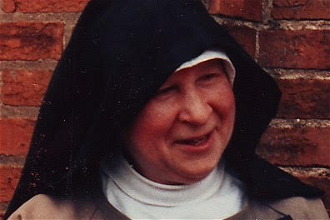Poor Clare at the Orange Tree Theatre, Richmond

Play poster - ICN screenshot
What do you know about St Clare?
The founder of the Poor Clares, perhaps? A great contemplative who twice saved Assisi from invading armies by the power of prayer and was known as alter Franciscus - another St Francis - so fully did she live out his ideals.
Charmingly, Clare is also the patron saint of television due to a 'live' vision of a Franciscan crib scene the other side of town when on her sickbed.
Making a superb stage debut in Poor Clare, Arsema Thomas gives us a vivacious but sensitive Clare, full of charm, courage and idealism. She and her excellent fellow actors play out her story, superbly scripted with humour, profundity and pathos by Chiara Atik, and it is a story which grips us by the challenge of its ongoing urgency and relevance.
At the dramatic climax of the play, Clare faces off in the church at Portiuncula with her beloved religious teacher Francis. She has fled here to join his new order.
Francis (Freddy Carter) had previously shown no fear when he 'mooned the bishop', stripping naked and giving away all he owned as a rich young man to live in rags and mendicancy in radical and outspoken solidarity with the poor.
This was a time of terrible violence, corruption and obscene wealth discrepancy. This man of feeling runs the gauntlet of 'idolatry', enacting a Christmas Nativity with beasts of burden and a baby 'in a sack of straw'. He embraces a leper.
But now the Poverello hesitates. He even contemplates consulting the bishop he had formerly denounced for worldly complacency.
It is Clare who guides his hand - literally. She kneels before him in a matching sackcloth robe and he starts to shear off her lustrous hair - so painstakingly coiffed by her servants throughout the play - in a ritual initiation into a religious life of total material poverty.
The message is clear. What was hard for Francis is so, so much harder for Clare in this cruel, violent and acquisitive man's world.
Atik's play is an inspired account of the journey of a woman's soul and flourishing in the face of manifold obstacles to her agency.
Clare is introduced as a pampered princess from a wealthy family, an ornament for the male gaze. She and her sister squabble over fashion in amusing US vernacular. (Think Clueless.) The 'poor' of the play's title sounds ironic here.
However, Clare is also spiritually inclined and intellectually curious. Her life changes when she hears Francis's uncompromising message of liberation theology avant la lettre.
Things come to a head when luxurious gifts from her much older fiancé are unpacked. Clare wants none of them and her attempt, bitterly resisted, to give away a bling gold necklace to her maid cracks open the ugliness of soul-sapping power struggles around possessions.
Despite pleading 'social anxiety', Clare acts on Francis's cue and takes the discarded clothes from rich women to a camp of beggars. Her encounter with a male resident is at first awkward but hugely instructive. Charity is replaced with dialogue and solidarity alongside the poor.
As she leaves, she places her own cloak over her interlocutor's shoulders - a powerful moment of communion which evokes similar cloak offerings by St Martin of Tours and Francis, himself.
Atik has an excellent eye for such strong ritual tableaux. Earlier, the put-upon maids had washed the feet of Clare, her mother and sister, recalling Christ's washing of his disciples' feet at the Last Supper, and the woman washing Christ's feet at the house of a disrespectful bigwig: both emblems of love and service - of turning the World upside down.
Just as Francis and Clare returned to the radical roots of the Gospel in their mission, so Atik has scored a palpable hit by returning to the dynamic popular roots of medieval religious theatre.
This was often delivered in a punchy vernacular and could be playful and satirical, employing anachronism to ambush its audience with a gut punch - these Gospel truths and stories were also Gospel truths for all time.
At the beggars' camp, there is a supermarket trolley, plastic sheeting, a fire in an oil drum and the resident wears modern clothes. So does an indigent 'war veteran'. Clare's mother recalls being confronted by appalling poverty when on pilgrimage in Palestine. Francis speaks the language of the contemporary Left.
In a final epilogue, Clare is on her knees, centre stage, in habit and veil, intoning Francis's 'Make me a channel of your Peace' prayer, before reciting a litany of sufferings which range from war-torn Yemen to the victims of corporate America.
How supremely hard it is to stand up to the abuse of power and to stand alongside the 'wretched of the Earth' - both then and now.
In her last words, Clare asks for the grace to be good.
Amen. Amen.
Beautifully directed by Blanche McIntyre, Atik's play is a hugely moving triumph.
Poor Clare is at the Orange Tree Theatre Richmond until 9 August 2025. It is also being streamed online.
For more information and booking see: https://orangetreetheatre.co.uk/


















